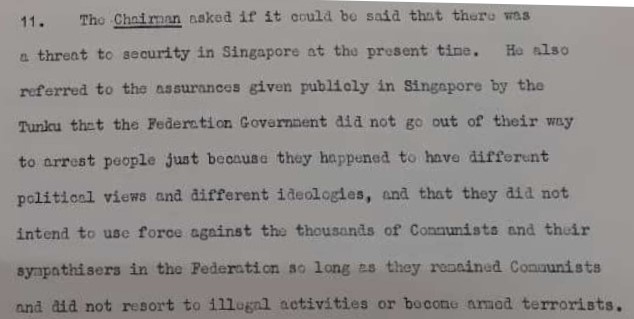Following the results of the Referendum on Merger with the Federation, it was clear that the communist threat, if ever there was one, had disappeared. Lee Kuan Yew’s desire for the arrests could not be justified on security grounds. Singapore leaders could not admit openly that they wanted the arrests on political grounds so they cooked up another story – that the arrests were necessary to protect against communism in the long term.
At the 26th meeting of the ISC held on 8th September 1962 which was not attended by Lee Kuan Yew but by Toh Chin Chye as acting Prime Minister, Lord Selkirk stated the following :

Goh Keng Swee, Singapore’s Finance Minister admitted that the reasons for the arrests were political. Paragraph 13 of the draft minutes of this meeting reads as follows:

Clearly, the desire for the arrests was based on the importance of making sure the PAP won the 1964 elections and because of any threat to the law and order can be seen in these minutes. However, this is not what Lee Kuan Yew wanted these minutes recorded.
We see substantial changes in the revised minutes designed to emphasize a long term security threat and at the same time referring again to the possibility of an ethnic conflict in Malaya.
The revised minutes read as follows:

As late as October 1962 the British were hesitating about agreeing to the arrests. Lord Selkirk insisted that “there was no immediate threat to law and order. The long term threat was political and required a political approach. Political problems could not be solved by police action …the United Front was playing the game constitutionally and the Singapore government should, if possible, endeavour to meet them on the constitutional front”. Selkirk avoids calling the members of the Barisan Sosialis “communists”.

It was clear to all parties at the ISC “that there was no immediate danger of violent subversion in Singapore.”
